If you're crazy about pickles, you'll be even more delighted with pickle seasoning! After I heard a few years ago about making pickle seasoning, I had to give it a try, and I thought it was about time that I share it.
Your Guide to Homemade Pickle Seasoning
I love, love, love pickles. Sweet, spicy, dill, pickle flavored potato chips, fried pickles…all so good. I love pickles so much that, when I was a child and an area pickle factory burned to the ground (it was night time and no one was there), I was teased for days about it with friends and family saying “sorry for your loss!”
As a homesteader or veggie gardener, cukes are a garden staple, and you probably have lots of homemade pickles on your shelf. But, if you don't or don't want to use the “good stuff” for this recipe, store-bought pickles will work just fine. (In fact, I used store-bought, a 17oz jar of hamburger sliced dills and a 17oz jar of hamburger sliced bread and butter pickles.) The best pickles to use are the hamburger slices, as they will dehydrate a bit faster. If you only have spears, just slice them up into thinner spears.
1. Drain the juice from the pickles
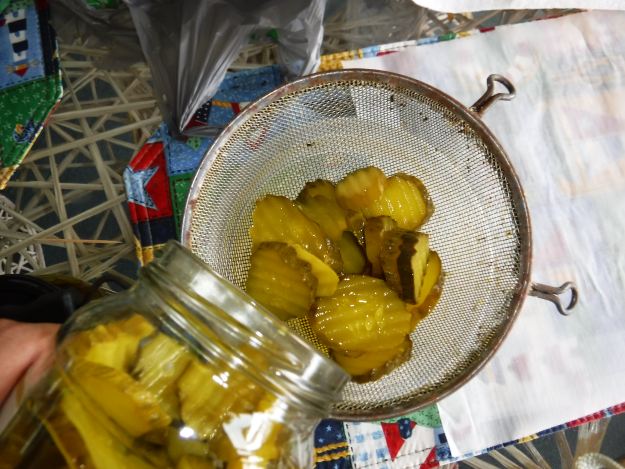
Do not throw the juice away! Put it back into a smaller jar and save it to use in meat brine or flavoring dishes. You can even slice up a few fresh cukes, throw them in the jar, and refrigerate them for a few weeks, shaking or turning the jar daily for another batch of really quick pickles.
2. Lay them out
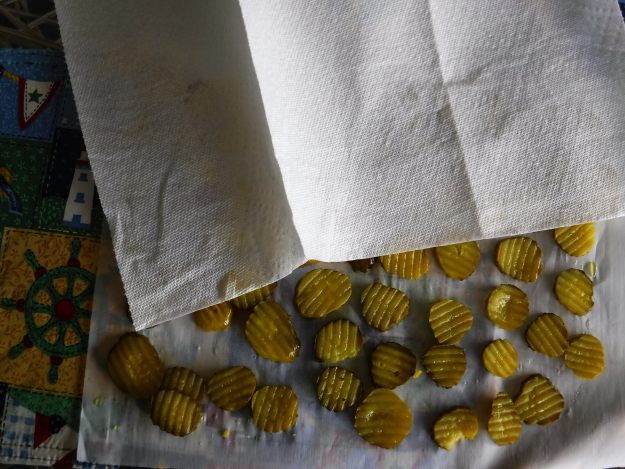
Lay the pickles out on a piece of parchment paper, then place a paper towel on top and blot them dry(ish). They should be dry enough to not drip into the bottom of the dehydrator but not bone dry.
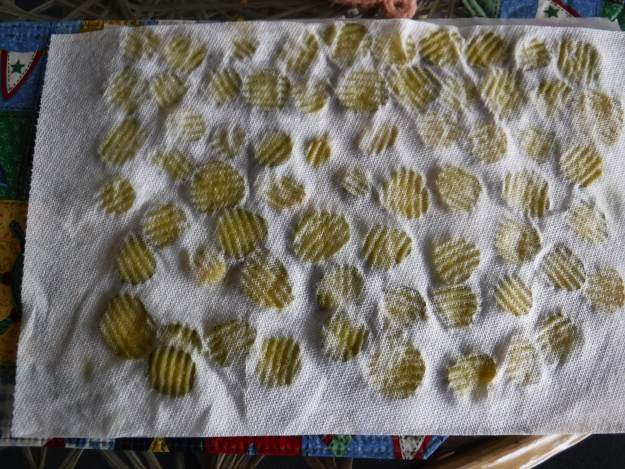
If some of the seasonings from the pickle brine sticks to the pickle, no problem. It will just give you some extra flavor later.
3. Place them on the dehydrator trays
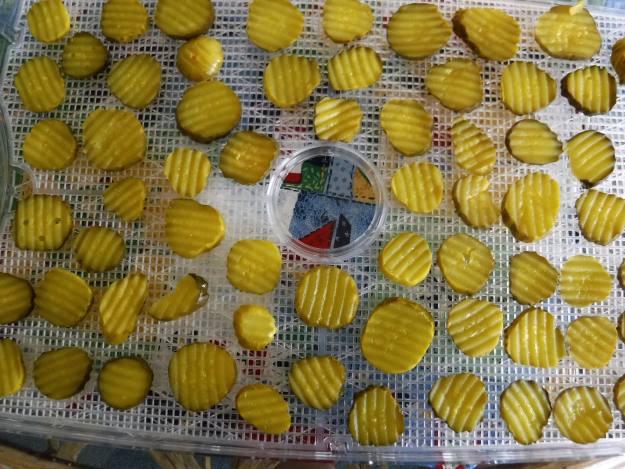
Lay the pickles onto the dehydrator trays, making sure the edges do not touch the tray or each other. If you are drying 2 flavors at one time, make sure it is one flavor per tray and be extra careful about remembering which flavor is on which tray. While this isn't a major issue if only working with 2 trays of different flavors, it will definitely matter if you are using multiple trays with multiple flavors. Dry according to the instructions that came with your particular dehydrator. Eventually, you will be able to figure out what temperatures and drying times work best for you, but this is a good starting point. (I found that, most likely due to the salt content, the dills dried much faster than the sweet bread and butter pickles.)
4. All dried up!
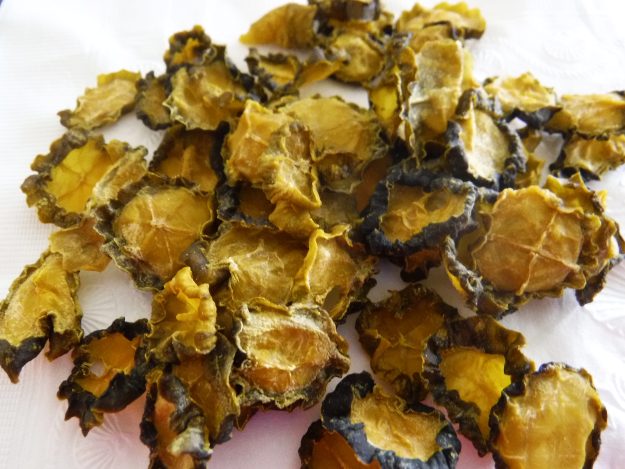
Remove the pickles as soon as they are dried. These should be dry to the point of no moisture. They may or may not being pliable any longer, but should have no moisture and should not be burned. If you're not sure about moisture, it is better to over dry (but not burn), otherwise your powder could mold. If you did end up with any burned, throw them away, as they will not have good flavor.
5. Grind your dried pickles
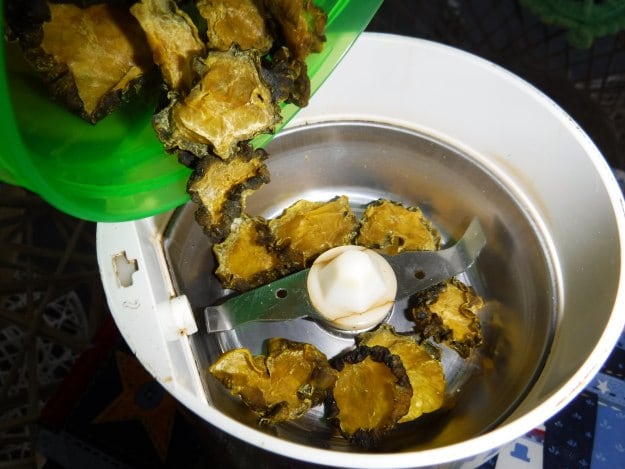
Using a spice grinder (a.k.a. a re-purposed coffee grinder used for spice grinding only), place dried pickles of the same flavor in the grinder and grind to a powder. Repeat until all pickles are powdered. Store pickle powder in an airtight, clean and dry container. Be sure to label which flavor is which and store container in a cool, dry, dark place.
Your homemade pickle seasoning!
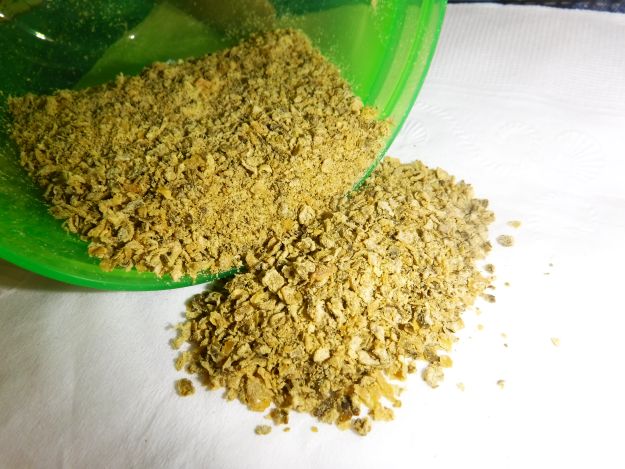
Use pickle powder as a seasoning for meats, veggies, seasoned topping for homemade crackers or rolls, or keep some of the dehydrated pickles whole and use for garnish…use your imagination! (Note that dills, powdered or whole, may be salty, so you may prefer to use a sweeter or spicier pickle whole.)
Check out this video on how to make spicy dill pickles!
And, on a final note, the dehydrated pickle chips, if kept whole, will easily re-hydrate. You use a little water for the bread and butter (you might want to add a tiny bit of sweetener to the water if you're concerned about the flavor being watered down), or a bit of vinegar and water for the dills. Dehydrating your pickles is an excellent space saver for hiking or prepper storage.
Have you tried making your own pickle seasoning? Please leave your tips and experiences in the comment section below!
Be guided with these 10 simple tips every urban homesteader needs to see!


like,info.JeffSchwersinske